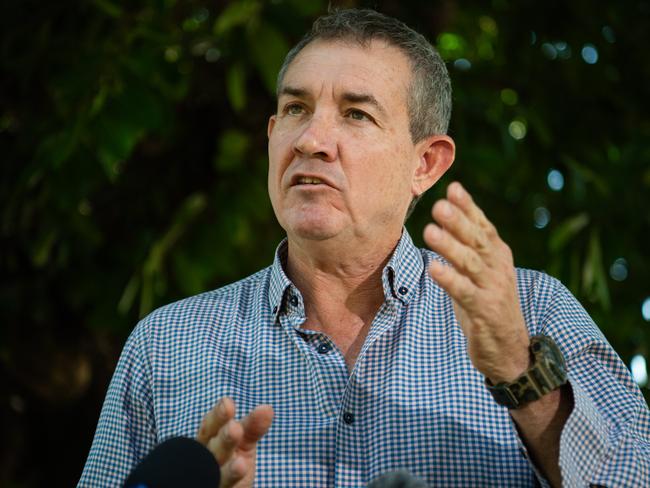Bruce McClintock SC reappointed as NT ICAC Inspector
High profile silk Bruce McClintock SC has been reappointed for a second term as the Territory’s Independent Commissioner Against Corruption watchdog after a national recruitment campaign.

Northern Territory
Don't miss out on the headlines from Northern Territory. Followed categories will be added to My News.
Bruce McClintock SC has been reappointed as Inspector of the Northern Territory Independent Commissioner Against Corruption for another five years.
The former defamation lawyer, who has represented high-profile clients including disgraced veteran Ben Roberts-Smith, actor Geoffrey Rush and cricketer Chris Gayle, has extensive experience as one of Sydney’s top silks.
In his role as Inspector Mr McClintock will evaluate the ICAC’s performance, deal with complaints and make recommendations about its operation.
His reappointment to the Territory’s ICAC Inspector was recommended by an advisory panel after a national advertising campaign for the role.
Legislation was also changed to allow for an Inspector to be reappointed for a second term.

Chief Minister Natasha Fyles commended Mr McClintock to parliament on Thursday morning.
“He has been our inspector and understands the principles of our legislation and integrity principles,” she said.
“It is quite a specialised position and we’re lucky to have someone of his experience willing to put their hand up.”
Opposition Leader Lia Finocchiaro supported Mr McClintock’s reappointment but said it was “a ridiculous roundabout way to end up back in the same place”.
She said the lengthy reappointment process could have been avoided if laws governing the ICAC had been reviewed sooner.
“Just to end up with the Inspector we already had - it would have been a cheaper, quicker, practical process.”
The role of ICAC inspector is an independent statutory appointment and reports back to the Chief Minister and Legislative Assembly.
Over the past five years Mr McClintock has overseen several investigations into the NT ICAC’s controversial former boss Ken Fleming SC.
Mr McClintock was previous ICAC Inspector in New South Wales and was last year appointed as the state’s Inspector of the Law Enforcement Conduct Commission.
Nov 29: Eviction periods extended, rental bidding banned in new laws
Rental bidding will be banned and eviction notice periods increased more than four-fold in a suite of reforms to strengthen tenant’s rights in the Territory.
The Residential Tenancies Legislation Amendment Bill, which passed parliament on Wednesday, also features a number of safeguards for victims of domestic violence, including protections for victims from having to pay for damage caused by perpetrator’s violent behaviour.
Notice periods for termination by landlords for both fixed and periodic tenancies will be increased to 60 days, up from the current two-week time frame for evicted tenants to find a new home – the shortest notice period in the country.
The Bill bans lease break fees, and means renters on fixed term agreements cannot be asked to pay for more than four weeks’ rent if leaving early.
Approvals will be streamlined for domestic violence victims to install additional safeguards such as screen doors, security screens and new locks, and pathways for landlords to pursue perpetrators for damage bills.

Attorney-General Chansey Paech said the changes, which were expected to come into effect in January next year, were aimed at improving access to “secure, affordable, stable and fair housing” and would help bring the NT in line with other jurisdictions.
While charging more than the advertised rental price would be banned under the new laws, clear penalties have not been established.
“The Act allows us to look at a whole range of options around enforcement or penalties, but what we are saying today is that rent bidding is banned and if people do find people doing the wrong thing, then there is an appropriate mechanism where that can be reported and then it can be followed through the enforcement practices,” Mr Paech said.
He said establishing an independent bond authority was “not off the table” for future reforms, but the possible “financial implications and unintended consequences” of bringing in such a body in “a small jurisdiction” needed to be worked through.

The opposition “acknowledged the need for reform” but said the legislation was “copy and paste” from other jurisdictions and did not always get the balance right.
“Rent bidding prohibitions and associated measures have overlooked significant impacts on landlords,” Deputy Opposition Leader Gerard Maley said in parliament on Wednesday.
“It may inadvertently worsen the housing crisis for both tenants and landlords.”
Mr Maley said the government was failing to address housing supply shortfalls driving up prices for renters, saying the rental reforms were “not a Territory driven approach to solving the housing crisis”.
NT Shelter commended the reforms but said “more must be done” for the almost 50 per cent of Territorians who rent.
“The Residential Tenancies Act plays a critical role in safeguarding the housing needs of Northern Territory renters, ensuring that tenants are not evicted unnecessarily into homelessness and providing pathways for people out of homelessness into accommodation,” regional co-ordinator Annie Taylor said.
Nov 28: Domestic violence laws updated to include coercive control
Advocates have welcomed reforms to modernise and strengthen the Territory’s domestic violence laws, but say it will be “meaningless” without needs-based funding.
New legislation, which passed through parliament on Tuesday, introduces a definition of coercive control into NT law, requires more information sharing from police, and recognises the role of technology in abuse.
It modernises the definition of economic abuse, includes a definition of emotional abuse, and strengthens requirements for people placed on Domestic Violence Orders.
The laws stop short of making coercive control a stand-alone offence, as other states such as Queensland and New South Wales have moved to do.

Anti-domestic violence campaigner and researcher Chay Brown said the cautious approach to criminalising coercive control was important to minimise the risk of women being misidentified as perpetrators by police and prosecutors – something for which Aboriginal women are particularly at risk.
“We need to see how it plays out in other states, we don’t want to rush into it,” Dr Brown said.
“There’s a fear of criminalising Aboriginal women who are primary victims, historically we’ve seen that play out too many times.”
“All the frontline services, police, healthcare workers, the judiciary, they need to have a really good, solid understanding about what domestic violence looks like and what coercive control means.”
Under the new laws, coercive control is defined as acts involving “violent, threatening or intimidating behaviour” that have the effect of “restricting the freedom of a person”.
Dr Brown said the move was a positive step but little would change without more funding.
“All of this ties into needs-based funding – we can have all the best legislation in the world but unless the government steps up and funds the essential services there’s no hope for things changing,” she said.

Northern Territory Council of Social Service similarly warned that without more money and training, the Territory’s domestic violence crisis was unlikely to improve.
“We welcome the modernisation of the definition of ‘domestic violence’ to include coercive control to better reflect the experiences of victim-survivors in the NT,” senior policy officer Sophie Hantz said.
“We reiterate that legislative change is one piece of the broader solution, we need comprehensive training provided to those who will implement these laws.
“The NT domestic, family and sexual violence sector needs a significant increase in funding to meet the extraordinary level of need in the Territory community. Without funding based on need, women and children will continue to go without access to support and safety, which will continue to result in deaths.”
The rate of domestic violence homicide in the NT is seven times higher than the national average, and Indigenous women are 13 times more likely to be killed by their intimate partners than non-Indigenous women and men.

Nov 27: Bottle shop security guards to soon carry capsicum spray
Private security guards at takeaway alcohol shops will be allowed to carry capsicum spray under new measures being introduced in parliament this week.
Under the changes to legislation private security companies can apply to be approved to use the spray and guards must undertake training before being granted a licence to carry the weapon.
Police Commissioner Michael Murphy said the “rigorous” application process included ensuring anyone who carried the spray was “a fit and proper person”, the employer was registered, training was completed, and there was “good governance at the location for security and training”.
“All those measures have to satisfy us under the Act before we issue,” he said.
The changes were flagged in March when the government introduced a seven-point plan to improve community safety in the wake of the fatal stabbing of bottle shop worker Declan Laverty.

From October Transit Safety Officers were granted powers to carry capsicum spray but Commissioner Murphy said safety concerns meant there were delays in extending the same powers to private security guards and crowd controllers as originally promised.
“We had more comfort around transit safety officers getting a (licence) initially with the governance measures governing employees,” he said.
“I need to be satisfied as the officer issuing the weapon and the licence to the person to use it that there are really strong measures in there that it won’t be misused.”
Braitling MLA Josh Burgoyne said the CLP supported the changes but they should have come sooner.
“This is so important. But it’s taken an extremely long time to get to this point where we’re now seeing legislation brought before the parliament. I seriously hope that it is brought on urgency because this is an urgent issue,” he said.
Police Minister Brent Potter said the government had worked with the hospitality sector to introduce legislation “with the right protections in place”.
“These changes will make it safer for hospitality staff and customers,” he said.
“There is never an excuse for violence, and security personnel need to be equipped to deal with any aggression or violence.”
Also on the agenda for the last parliamentary sitting dates of the year are reforms for domestic violence, environmental regulations, renters’ rights, and improving support for victims of crime.
More Coverage
Originally published as Bruce McClintock SC reappointed as NT ICAC Inspector





